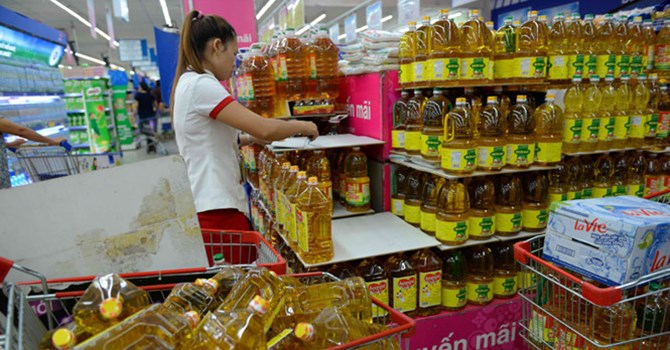
Kido (KDC), well known as a sweets manufacturer, has jumped into the vegetable oil market after it completed a deal of taking over a 65 percent stake of Tuong An Vegetable Oil last November.
Prior to that, Kido acquired a 24 percent stake of Vocarimex, also a large vegetable oil manufacturer. Sources said Kido plans to increase the ownership ratio to 51 percent soon.
There are nearly 40 manufacturers and traders. Tuong An is one of the four leading companies with annual revenue of VND4 trillion. The other three include Vocarimex, Cai Lan and Nha Be.
With huge investments in two big producers Vocarimex and Tuong An, Kido has shown its ambition of becoming the leader in the cooking oil market. Kido also makes cooking oil products of its own.
|
The cooking oil market with annual revenue of VND30 trillion, a high growth rate and low average consumption per capita has become an attractive market. |
Sao Mai An Giang, a real estate developer, has spent VND500 billion to build a plant that makes cooking oil from basa fish fat with Ranee brand. Meanwhile, Daso Group, specializing in providing logistics services, has also launched two new vegetable brands Ogold and Binh An. Quang Minh JSC has marketed cooking oil products with Mr Bean, Soon Soon and Oilla brands.
According to the Ministry of Industry and Trade, the average consumption level per capita in Vietnam is 9-10 kilos per annum, lower than the 13.5 kilo level suggested by WHO. However, it is expected that the consumption level would rise to 18.5-19 kilos per capita by 2025.
In 2015, the total cooking oil output was 812,000 tons, while the consumption was 920,000 tons.
Competitive market
According to Euromonitor, Tuong An now holds 20 percent of market share, much lower than Cai Lan’s 40 percent, though thevmarket share was nearly the same for both of them in 2008.
A survey showed that in 2009-2011, the market share held by imports increased from 33 percent to 51 percent, while the market share held by domestic companies fell from 37 percent to 22 percent.
Therefore, in mid-2013, Vietnam applied a safeguard duty of 5 percent (which has decreased to 2 percent) on imports. However, analysts commented that Vietnamese companies still cannot take full advantage of the safeguard duty.
Meanwhile, Singaporean Wilmart’s Cai Lan has grown rapidly during that time to become the leading manufacturer. In mid-2016, Wilmart took over a 45 percent stake in Bunge’s soybean plant in Vietnam.
A lot of new rivals have appeared. Musim Mas has built a $70 million factory with capacity of 1,500 tons per day. Felda Global Ventures has joined forces with Kido to conquer the Vietnamese market.
| related news |
Kim Chi